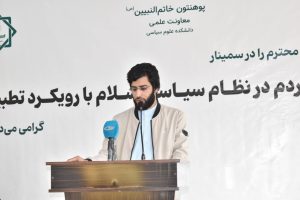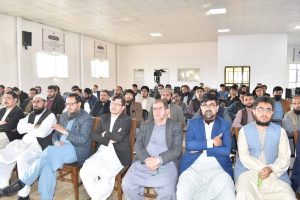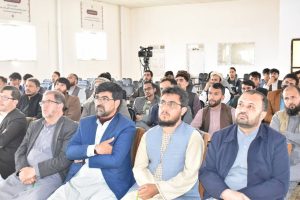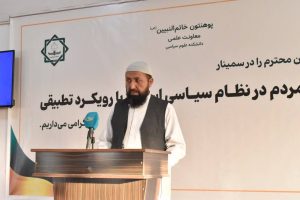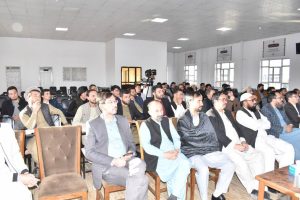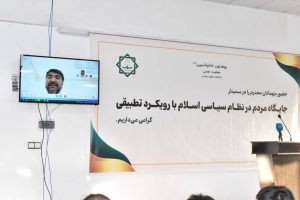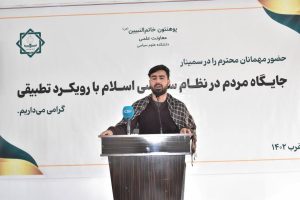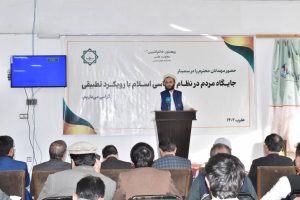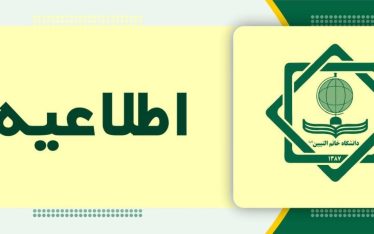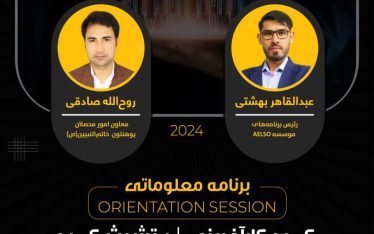🔹Scientific seminar entitled: People’s position in the Islamic political system with a comparative approach was held with the initiative of the Faculty of Political Sciences of Khatam Al-Nabieen University (PBUH).
🔸 This seminar was held in line with the implementation of the operational plan of the Faculty of Political Sciences and with the aim of improving the capacity of the students of the bachelor’s degree in political science and the master’s degree in international relations on Monday, 8 Aqrab 1402.
🔸 The program began with the recitation of a verse from the Holy Quran by Qari Ahmad Komil Sarvari and directed by Mr. Khan Jan Dadmand, a master’s student in international relations.
🔸 Mr. Dadmand also thanked the Faculty of Political Sciences, especially the Dean of the Faculty, Mr. Mohammad Javad Mohaddasi, for planning and holding this seminar; They honored the presence of experts, professors, officials and students and stated that holding seminars like this will increase the students’ analytical skills and clarify the obscure aspects of the issues.
🔸 In the first part of the program, Haseebullah Ramani addressed the students of the master’s degree in international relations, he analyzed the position of the people in the political system of Islam according to the hadith of the Prophet (PBUH) that was mentioned in his farewell Hajj. And they stated that in that hadith, the Prophet forbade the blood, property and honor of Muslims to each other and this makes it clear what is the position of people in the political system of Islam. They ended their talks with detailed explanations about hadith.
🔸 In the next and main part of the program, Dr. Seyed Abdul Qayyum Sajjadi, the honorable president of Khatam Al-Nabieen University (PBUH) and the academic staff of the Faculty of Political Sciences, while appreciating the enthusiastic attendance of the participants and sending greetings to the souls of the martyrs of the path of Islam and especially the recent martyrs of the nation. The oppressed of Palestine continued their speech and said that the political system of Islam and the position of the people in it is one of the most important issues of the Islamic nations.
🔸 Dr. Sajjadi proposed the four principles for the Islamic political system and stated that the justice of belief (according to verses 58 and 59 of Surah Mubarakah Nasa) is the basis of the Islamic political system, and Iqama is the philosophy of sending messengers and the transmission of divine books, the principle of trust that political power It is a trust and not a goal, and this trust must be used to serve God’s servants. The principle of council is one of the other principles of Islam, and in the political system of Islam, beyond the council, laws and instructions cannot be enacted. From his point of view, there are many questions about the philosophy of the Shura, and one of the basic questions is why the Prophet (PBUH) instituted the Shura while he was in contact with the source of revelation and did not need to be consulted. Scholars have answered that the importance of Shura caused the Prophet to institutionalize this tradition, and still nothing has been mentioned about the mechanism of Shura in Islamic texts because this process takes time and during different times, different principles emerge. Finally, the last principle is the responsibility of coordination that the believer is responsible and accountable; For this reason, the Ummah of the Prophet has been considered the best Ummah.
🔸 Prof. Abdul Ahad Muslim (Professor of Kabul University of Education) among the other speakers of the parliament said that the principles of Islam are clear and comprehensive, but the problem is in implementing the principles. First, based on verse 59 of Surah al-Nisa regarding obedience to God, the Prophet, and the Guardian; They considered the existence of a political system to be essential for Islamic societies and put forward the position of the people in the political system as a source of power. Regarding the position of the people in the political system of Islam, he stated that the people are the pillars of the system, the source of power, the supporting force of the system, and the supervisor of the government’s operations, and in the process of systematization, the government is for the people, and the leader in the political system is the dignity of the father for the family. has the
In the last part of the program, Dr. Mohammad Vahid Binesh, the head of the board of post-graduate programs and a member of the faculty of political science, made a speech and said that every type of political system has four types of capital; Material capital, physical capital, human capital and social capital. Social capital regulates human relations in a society and ensures mutual trust between people and the political system. Trust provides legitimacy for the government and peace and prosperity for the people. Trust is obtained through justice, satisfaction, fair distribution of wealth, stability, etc. Mutual trust in a political system will lead to solidarity, which is the cause of other examples of progress in societies.
This seminar ended with a wish for stability and progress in Islamic societies and especially in Afghanistan.
